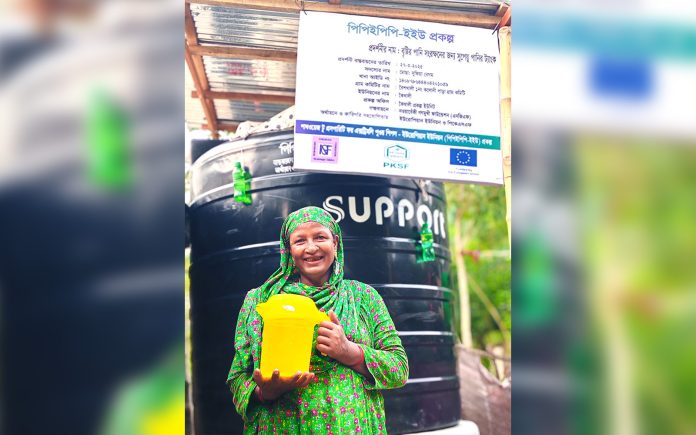Every year, cyclonic storms and the accompanying rain and tidal surge damage homes and crops, submerge houses, ponds, and tube wells, and set off a severe food and drinking water crisis for the extremely poor people living along the coast of Bangladesh. The country’s south-west coastal belt faces periodic cyclones, tidal surges, floods, and chronic waterlogging, which cause severe saltwater intrusion and contaminate the drinkable water sources.
Salinity intrusion poses a significant environmental risk, as many rivers in the south are being filled with saltwater, and the water layer has also dropped in some areas. Although the wet season brings massive amounts of freshwater, it ceases during the dry season, leading to increasing salinity. Thus, the combination of salinity, rising sea levels, and decreasing groundwater levels creates an acute crisis of potable water for many extremely poor households in PPEPP-EU’s southern working areas, including Khulna, Bagherhat, Satkhira, Patuakhali, and Bhola.
Considering the salinity of water and soil, as well as the contamination of water resources in coastal regions, the project actively works to ensure access to safe drinking water for its members and the local community. PPEPP-EU installs water treatment plants at the community level and distributes rainwater harvesting tanks at the household level. Until now, PPEPP-EU has installed 17 Reverse Osmosis (RO) plants to desalinate and purify water for the local community and distributed 2,170 rainwater harvesting tanks among its member households.
However, this effort cannot fully address the significant demand for safe water, as many PPEPP-EU members residing in the coastal belt remain out of the reach of potable water. Women and children often have to walk miles to fetch water from ponds or other local sources. Given this dire crisis, PPEPP-EU prioritises arranging rainwater harvesting tanks and tube wells for its members through its advocacy efforts with the local government offices, such as the Union Parishad.
The PPEPP-EU project, across its working areas, has distributed 1562 rainwater harvesting tanks and 802 tube wells to its member households through effective linkage with local governments. Members collect rainwater in these tanks during the monsoon and use it for drinking and cooking for up to six months in the dry season. PPEPP-EU vows to continue this initiative to ensure safe drinking water and promote a healthy life and sustainable growth for these households.


